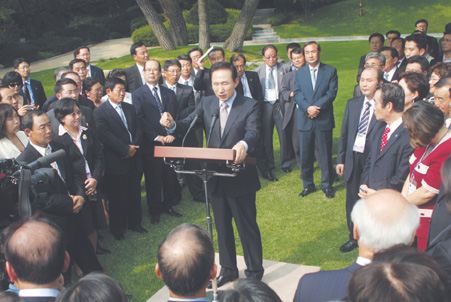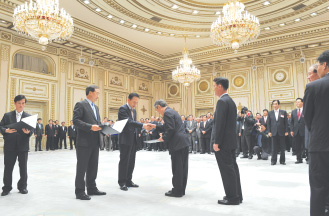NUAC: Civilian Crusaders for Unification
The sole government organization carrying out people-to-people diplomatic activities for a unified Korea; stages ¡¯Rainbow Movement¡¯ on integration of government policies towards the North

The National Unification Advisory Council (NUAC) was inaugurated as a presidential policy advisory body in 1980. At that time, it was called the Peaceful Unification Policy Advisory Council, but it changed to its current name in 1987. The Secretariat of the Peaceful Unification Policy Advisory Council was disbanded and reorganized into the Unification Ministry before being separated as an independent body under the jurisdiction of the President.
The NUAC has approximately 17,000 councilors working without pay in Korea and abroad. It has 231 city, county and ward-based regional consultative committees across the nation and others in 101 foreign countries. The council is chaired by the President, who appointed Lee Ki-taek to serve as executive vice chairman and Kim Dai-sik as secretary-general in charge of its operation.
ASSISTANCE PROJECTS TO THE NORTH
The NUAC carries out aid programs to North Korea, primarily designed to promote food support for North Korean children, through its subsidiary non-government organization, South-North Korea Sharing Community. In 2008, it built a factory for powered milk for infants in Pyongyang and sent 100,000 coal briquettes to the North.
As inter-Korean relations have soured since the inauguration of President Lee Myung-bak, significant inter-Korean exchanges have not been made, but the NUAC is expected to perform brisk inter-Korean exchanges if ties between South and North Korea thaw in the years to come. The council said it is seeking to have part of the South-North Korea Cooperation Fund from the Ministry of Unification available for invigorating inter-Korean exchanges with hope of becoming a new window for improving relations between South and North Korea.
ETHNIC KOREAN COMMUNITY NETWORK
It is noteworthy that the NUAC has a wide-ranging network among the millions of Korean overseas residents. The council is doing its utmost to build an ethnic Korean community network around the globe via its overseas organization.
Currently, 7.5 million people of Korean descent live overseas throughout the world due to the bitter legacy of Korean history. The diaspora has now become an invaluable asset of the Republic of Korea. It means that a second ROK the size of Austria or Sweden in terms of population exists abroad. Experts agree that the nation should make the most of the overseas Korean manpower in order to achieve the goal of evolving into an advanced nation in the 21st century. 
NUAC Executive Vice Chairman Lee Ki-taek said, ¡°The major players of the upcoming unification era will be overseas Korean residents themselves, and among the overseas Korean residents, those in Russia and Central Asia, who preserve the traditional Korean culture South and North Koreans share. Even though South and North Koreans are considered to have changed much, we can sense our common identity: being the same Korean people while looking at them (those in Russia and Central Asia), so they may be deemed to be the persons who can play a bridge connecting South and North Korea.¡±
The NUAC has so far been conducting activities to expand a foundation for unification with a focus on overseas regions and build infrastructure for international cooperation. The council¡¯s overseas regional consultative committees are the channels for overseas Korean residents to suggest opinions on unification policies of the motherland, imbuing them with pride in their participation in state affairs of the nation. The council also forms public opinions on Korea¡¯s unification policies the mainstream of each country and overseas Korean residents can share and conducts activities to imbue second and third-generation Korean descendants with a firm sense of national identity and views on unification.
2ND ESTABLISHMENT
The NUAC declared its willingness to play a leading role in creating national integrity and expanding the foundation for unification by renewing itself among people in 2009. Speaking specifically, the declaration calls for each of the 17,000 councilors to recruit at least six people as crusaders for the cause of unification. This will lead to the cultivation of 100,000 crusaders for unification and the launch of the so-called ¡°Rainbow Movement¡± on the integration of government policies on the North involving 100,000 unification crusaders.
The current 14th NUAC carries out the following four core business guidelines. First, the council aims to contribute to the promotion of co-existence and co-prosperity between South and North Korea by recommending to the President programmatic unification policies toward the North. It seeks to recommend preemptive and adaptable policies on pending, mid and long-term unification tasks while ramping up its role of gathering public opinions by expanding its regional consultative committees¡¯ coverage in Korea and abroad.
Second, the council strives to spearhead national integration on unification through the Rainbow Movement and brace itself for a post-unification era. The NUAC is soliciting people¡¯s voluntary participation in the movement.
Third, the NUAC targets the realization of a unified Korea around the globe by building an ethnic Korean global network. With the councilors from 101 foreign countries playing leading roles, overseas consultative committees of the council will be developed into centers of the ethnic Korean global network through which communications with overseas Korean residents will be reinforced and the momentum for unification among them will be mustered.
In a word, it can be summed up as people-to-people diplomatic efforts for unification. A look into the process of unifying Germany indicates that the unification of the Korean Peninsula cannot be obtained without the approval of a unified Korea by the international community. The international community, including the interested parties of the peninsula, the United States, Japan, China and Russia as well as the EU, should have an understanding of and give the approval of a unified Korea.
In this regard, diplomatic activities on unification need to be beefed up, but experts concur on the fact that efforts by governments alone are not enough. Since it has civilian councilors in 101 foreign countries, the NUAC is the sole government organization that can carry out people-to-people diplomatic activities, so the council¡¯s civilian activities on unification will become more important in the future.
Lastly, the council tries to carve out its own image among people by translating into ¡°noblesse oblige¡± the actions it plans. These activities can be executed through regional consultative committees scattered throughout the country like the capillary vessels of the body. The NUAC stages diverse volunteering activities, including a project to help refugees from the North settle in the South. The settlement program for North Korean refugees is one of the council¡¯s major projects that have been given priority since the inauguration of NUAC Executive Vice Chairman Lee.
President Lee, chairman of the council, once urged its executives and staff to play their part, citing a 2nd establishment. The council, marking its 30th anniversary this year, is exerting flat-out efforts to overhaul its organization in order to make it a substantial body for performing, studying and serving. nw
President Lee Myung-bak gives a speech in his capacity as the chairman of the National Unification Advisory Council (NUAC) at a meeting of members from overseas NUAC regional consultative committees at Cheong Wa Dae on Sept. 10, 2008.
President Lee presents appointment certificates to the senor members of the NUAC, who were newly appointed for a two-year term on June 22, 2009.
Photo by courtesy of the NUAC
3Fl, 292-47, Shindang 6-dong, Chung-gu, Seoul, Korea 100-456
Tel : 82-2-2235-6114 / Fax : 82-2-2235-0799